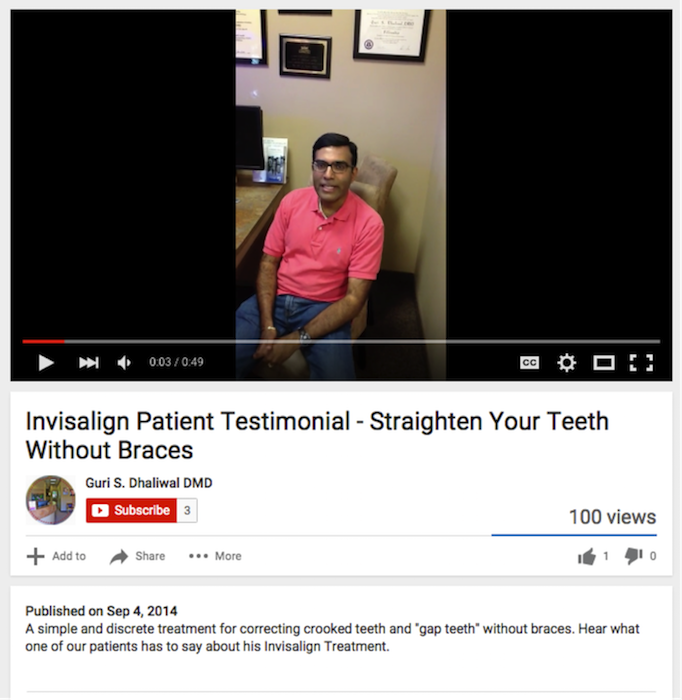5 Ways Your Dental Practice Can Win More Patients (and More Smiles) with SEO
February 1st, 2016 by


Today’s dental patient is becoming much more Internet-savvy.
- 81% will do research online before booking an appointment
- 71% will find their new dentist on the first page of a search engine result page like Google or Bing
- 55% will choose one of the top three results
It’s no longer good enough to simply have a website. If your site doesn’t show up on the first page of the search engine results pages (SERPs), you are losing potential patients. Maybe you already have a search engine optimization (SEO) strategy but have yet to notice the benefits of increased exposure and web traffic. Or maybe you haven’t thought much about SEO. Either way, there are a few steps worth considering to boost your client referrals. Here are five fundamental and actionable tips to help you maximize the effectiveness of your website.
1. Local Keywords and Your Specialty
By adding hyper-targeted and high-converting keywords to your website’s content, you can achieve a higher organic ranking in the SERPs. Instead of choosing “dentists” as your keyword, pick out an area of specialty. It is much easier and more effective to optimize “pediatric dentist” than “top dentist.” With a targeted keyword, you will be able to avoid competition from across the country and reach out to people who need you for specific dental services.
2. Dental SEO Blogging
A dental practice website with a blog section is leveraging Google’s algorithm in their favor. A regularly updated blog helps boost your SEO rankings in two different ways. First, you can include your keyword in the first section of the post, which can facilitate organic traffic. Blog posts also help give your website unique, non-duplicate content. When a searcher is searching for your keyword, all duplicate content is noted by the search engine, and those websites are punished for their inauthenticity. Blog posts that include your keyword will help your overall ranking.
Between teeth whitening and root canals, the average dentist does not have a lot of time to devote to a blog. But blogging does not have to be a time-consuming task. When writing a blog post, consider using reader-friendly formatting like lists, including outbound links to resources, providing actionable tips, writing in a conversational tone, and using real-life examples. As an integral content marketing tool, your blog will help boost your SEO ranking and convey a professional, helpful image.
3. Build Backlinks
Backlinking is a central element of SEO, and to boost your SEO ranking, you need to generate content that others will want to link to. Having creative, informative blog posts can also help build backlinks, mostly because people will want to share your posts. Another way to build backlinks is to get featured. If you ever have the chance to write a blog post or opinion piece for a medical publication, do it! If a local new station wants your advice on a new dental implant treatment, don’t shy away! When you appear on another website, a link to your website is often included in the story. In the eyes of the search engine algorithms, this is one of the most effective ways to gain authority, boosting your SEO ranking.
4. Don’t Be Camera Shy: Use YouTube
You went to dental school, not film school, but if you have the resources, making a short YouTube video can really boost your SEO ranking. YouTube is the second-largest search engine on the Internet, but because videos generally have less competition, a video can rank higher in the SERPs. If you are targeting a region, you should include that area in the video’s title. Even though your video doesn’t have to have Leonardo DiCaprio in it, it also doesn’t have to win an Academy Award. Instead, it should focus on sharing general information about your practice or medical tips. You could even get patients involved and use videos as a platform for sharing patient testimonials. Whatever your approach is, video content will help tag your website as a superior one.


5. Get Social
A strong presence on social media can help the trustworthiness of your site. Because Google+ is owned by Google, your dental practice should put an extra emphasis on gaining +1s and building a network. In 2013, then-Google CEO Eric Schmidt said, “Within search results, information tied to verified online profiles will be ranked higher than content without such verification, which will result in most users naturally clicking on the top (verified) results. The true cost of remaining anonymous, then, might be irrelevance.” For optimization purposes, you cannot just have a verified account: you must also regularly post and try to gain followers. Facebook has only minor effects for healthcare SEO ranking, but it is a great tool for building a presence in your community. The number of times your office is tweeted about, as well as the number of tweets you tweet, can also slightly impact your ranking. No matter the platform you choose, make sure all of your posts are relevant and authoritative, as these posts will be most likely to gain a reaction from your audience.


There are many elements that impact your SEO ranking. These are five actionable tips that every dentist should be using for their SEO strategy.
Image Credits:
Dentists at Work Image
YouTube Invisalign Patient Testimonial
Guri S. Dhaliwal Facebook Page


Nice article- As a dental marketing professional I find it odd with how many dentists have yet to adapt to online marketing. When you sit in any waiting room the vast majority of people tend to be occupied with their cell phones. An online presence is vital to the success of a dental practice nowadays.